
Nevada's Republican governor who endorsed Donald Trump for president found himself pleading with his own party to leave Medicaid alone, after House Republicans advanced their budget late Tuesday, which ostensibly calls for cuts to the government health care program for low-income Americans.
The House GOP budget resolution calls for significant cuts that are likely to impact Medicaid funding. The resolution directs the House Energy and Commerce Committee, which oversees Medicaid, to find $880 billion in spending cuts over the next decade. While the resolution does not explicitly mention Medicaid cuts, the math and structure of the budget make it highly likely that Medicaid will bear the brunt of the planned cuts.
And that has left some Republicans across the country feeling like they're stuck holding the bag.
ALSO READ: 'Gotta be kidding': Jim Jordan scrambles as he's confronted over Musk 'double standard'
Gov. Joe Lombardo penned a letter Wednesday asking Congress to avoid slashing Medicaid funding, The Nevada Independent reported. He acknowledged that while fiscal responsibility is critical, slashing the program could have "serious consequences."
“Nevada has demonstrated that federal investment in the state’s Medicaid program has improved both health outcomes and productivity, yet challenges remain,” Lombardo said. “By leveraging federal funding the state has expanded access to school health services, lowered the uninsured rate, and made significant progress in enhancing behavioral health care for both children and adults.”
Medicaid allows his state flexibility to adapt to changing demographics, he said. Limiting Medicaid funding would "clearly hinder that ability.”
Lombardo specified what he called proposals that would be "most detrimental" for his state: rolling back "critical expansion population funding," "limiting federal funding with a per capita cap model," and "lowering the safe harbor for provider taxes for hospitals."
“Beyond its role providing coverage for vulnerable populations, hospitals, clinics, and providers across the state depend on Medicaid reimbursements to sustain operations, maintain staffing levels and invest in critical services,” Lombardo told state lawmakers separately.
As of October, 72.1 million people were enrolled in Medicaid nationally.




